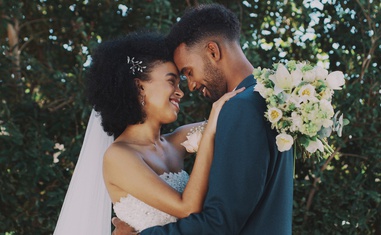The views expressed in our content reflect individual perspectives and do not represent the authoritative views of the Baha'i Faith.
“We really don’t want to get married,” two friends told me a few years ago. “Why not?” I asked since they were so obviously in love. “Well, because there are just too many failed marriages and divorces.”
I thought this rationale sounded a little like “I really don’t want to get an education – because too many people drop out of school.” Or: “I don’t want to learn to drive – too many accidents.” Those rationales don’t make much sense, do they? Looking only at the potential downside of any endeavor means ignoring all of its potential upsides.
To refrain from marrying the person you love because your marriage might not work seems to be admitting defeat before you begin.
To help avoid that premature defeat, Baha’i marriage has a few guardrails to offer. Here are three of those recommended protections for a sustained, long-term marriage, applicable to any couple, not just Baha’is.
RELATED: 4 Steps to Create a Sustainable Relationship
1. Getting to Know the Character of the One You Love
First, the Baha’i teachings advise us to “exercise the utmost care” to thoroughly get to know and evaluate the inner character of any potential mate. Abdu’l-Baha wrote:
Baha’i marriage is the commitment of the two parties one to the other, and their mutual attachment of mind and heart. Each must, however, exercise the utmost care to become thoroughly acquainted with the character of the other, that the binding covenant between them may be a tie that will endure forever. Their purpose must be this: to become loving companions and comrades and at one with each other for time and eternity….
This isn’t easy, especially in modern times. Traditional dating generally doesn’t readily reveal one another’s true characters, because it encourages couples to display only their superficial, socially-desirable outer qualities – physical attractiveness, wealth, status, their “fun” quotient – to one another. Much of the time, dating superficially and effectively hides the more important inner qualities and character traits, which can lead to hasty and often unsuitable marriage decisions, and the inevitable divorces that follow.
Instead, to really become thoroughly acquainted with one another’s true characters, it can help to do things together that naturally make a person’s inner qualities come forward – like service activities, trying new things together, travel, or working on a mutually agreed-upon project that benefits others.
As just one example, a couple I know who have now been happily married for several decades, decided, instead of dating in the usual way after they met, to start their relationship by babysitting her older sister’s small children once a week. They quickly learned a great deal about each other – how the other person dealt with stress and difficulty, how they each tended to approach the raising of children, how well they played together with others – and the experience helped them get to know each other at a deep level and helped them when they had their own children after marriage.
2. Involving and Uniting Both Families with Parental Consent
After they’ve become fully aware of each person’s character in the relationship, and have decided to make their relationship permanent, Baha’is seek permission to marry from all living parents.
This may initially seem like an old-fashioned practice when a suitor had to ask the father for his daughter’s hand in marriage. But for Baha’is, it applies equally to both of the people in the relationship, and to all four of their parents, fathers and mothers alike.
This universal parental consent recognizes a fundamental truth – when you marry, you’re bringing not only your partner into a brand new committed relationship, but in a way you’re marrying his or her family, too. Creating that kind of committed unity with prior consent can have a powerful effect on the lasting nature of the union, because no primary family member can ever say, later, that they opposed the marriage from the start. Consent harmonizes the families and brings them into a premarital state of unity, not only with their adult children but with the spouse’s family, as well.
Baha’u’llah, the prophet and founder of the Baha’i Faith, writing in his Most Holy Book, said:
Desiring to establish love, unity and harmony amidst Our servants, We have conditioned [marriage], once the couple’s wish is known, upon the permission of their parents, lest enmity and rancour should arise amongst them.
Also, the Baha’i teachings forbid arranged marriages, with Abdu’l-Baha clearly saying:
As for the question regarding marriage under the Law of God: first thou must choose one who is pleasing to thee, and then the matter is subject to the consent of the father and mother. Before thou makest thy choice, they have no right to interfere.
Baha’i marriage, then, is not only voluntary but is entered into with the blessing and agreement of all, forging a lasting bond of love between the couple and their families.
3. Marriage: A Spiritual as Well as a Physical Union
Marriage, from a Baha’i perspective, goes far beyond a merely physical relationship – instead, it must include the deep, inner spiritual components of a true union, according to Abdu’l-Baha:
The true marriage of Baha’is is this, that husband and wife should be united both physically and spiritually, that they may ever improve the spiritual life of each other, and may enjoy everlasting unity throughout all the worlds of God. This is Baha’i marriage.
After all, Abdu’l-Baha pointed out, our spiritual lives last eternally, while our physical bodies are destined not to:
Marriage, among the mass of the people, is a physical bond, and this union can only be temporary, since it is foredoomed to a physical separation at the close.
Among the [Baha’is], however, marriage must be a union of the body and of the spirit as well, for here both husband and wife are aglow with the same wine, both are enamoured of the same matchless Face, both live and move through the same spirit, both are illumined by the same glory. This connection between them is a spiritual one, hence it is a bond that will abide forever. Likewise do they enjoy strong and lasting ties in the physical world as well, for if the marriage is based both on the spirit and the body, that union is a true one, hence it will endure. If, however, the bond is physical and nothing more, it is sure to be only temporary, and must inexorably end in separation.
When, therefore, the people of Baha undertake to marry, the union must be a true relationship, a spiritual coming together as well as a physical one, so that throughout every phase of life, and in all the worlds of God, their union will endure; for this real oneness is a gleaming out of the love of God.
RELATED: Achieving Marital – and Spiritual – Bliss
When Baha’is marry, or when people who aren’t Baha’is wish to have a Baha’i marriage, the marriage ceremony is simple, direct, and dignified. Since Baha’is have no clergy, the couple marries one another by saying a brief but powerful phrase from the Baha’i writings: “We will all, verily, abide by the Will of God.” Of course, the couple and their families can and often do add to that spoken commitment with prayers, music, quotations from the holy scriptures, and meaningful passages from other traditions, as well. Baha’i marriages are joyful celebrations of love and life!
The Baha’i teachings include many beautiful, lyrical, and spiritually uplifting marriage prayers, including this one from Abdu’l-Baha:
O my Lord, O my Lord! These two bright orbs are wedded in Thy love, conjoined in servitude to Thy Holy Threshold, united in ministering to Thy Cause. Make Thou this marriage to be as threading lights of Thine abounding grace, O my Lord, the All-Merciful, and luminous rays of Thy bestowals, O Thou the Beneficent, the Ever-Giving, that there may branch out from this great tree boughs that will grow green and flourishing through the gifts that rain down from Thy clouds of grace.
Verily Thou art the Generous, verily Thou art the Almighty, verily Thou art the Compassionate, the All-Merciful.
All of these spiritual components help create that permanent state of love and unity, that fortress for well-being, which characterizes a true Baha’i marriage.

















Comments
Sign in or create an account
Continue with Facebookor